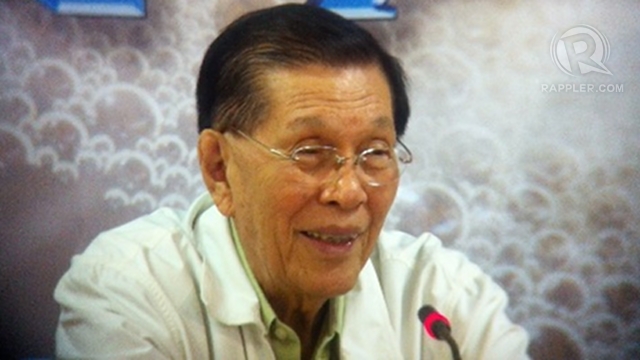SUMMARY
This is AI generated summarization, which may have errors. For context, always refer to the full article.

MANILA, Philippines – Why not have judges and justices go through the Commission on Appointments again?
Senate President Juan Ponce Enrile raised this proposal amid changes in the selection process for the next chief justice.
At the weekly Kapihan sa Senado press forum, Enrile echoed the position of House Speaker Feliciano Belmonte Jr that the Senate and the House should each have one vote in the Judicial and Bar Council (JBC).
Enrile was responding to a July 17 Supreme Court ruling, which the Tribunal will make public on Thursday, that Congress should have only one vote in the JBC. The Senate President said the Supreme Court must recognize the bicameral nature of Congress.
“Kaya siguro dapat ibalik ‘yung Commission on Appointments [system]. Noong araw, lahat ng mga huwes, kasama ang mga mahistrado ng Korte Supreme, dumadaan sa Commission on Appointments.” (That’s why maybe we should return to the Commission on Appointments system. Before, all the judges even Supreme Court justices, pass through the Commission on Appointments.)
The system of having appointees to the judiciary go through the CA was abolished in the 1987 Constitution amid criticism that it politicized the selection process. The CA is composed of politicians, namely members of the Senate and the House.
Observers, however, said that even without the CA, the current selection process is still susceptible to politics and horse-trading.
Enrile did not elaborate on his proposal but stressed that the Senate and the House must have one vote each in the JBC.
The chairpersons of the Senate and House Committees on Justice are ex-officio JBC members. Currently, Senator Francis Escudero and Iloilo Rep Niel Tupas Jr sit on the JBC.
“If a retired justice of the Supreme Court will have one vote, why should not the representative of either House of Congress have a vote of equal weight? If a member of the Integrated Bar [of the Philippines] will have one vote, why should a member of the Senate or the House have a lesser weight?”
As Senate President, Enrile presided over the impeachment trial of former Chief Justice Renato Corona. The Senate voted to convict Corona of culpable violation of the Constitution and betrayal of public trust in a trial that ended on May 29.
‘No half votes’
Enrile said the framers of the Constitution did not intend a scenario where the Senate and the House representatives will each have just a half-vote in the JBC.
Asked how the representatives of Congress should vote with the new ruling, Enrile said in jest, “Ewan ko. Siguro bunutan. Jack and poy, throw the dice.” (I don’t know. Maybe they will draw lots, throw the dice.)
Enrile said questions surrounding the composition of the JBC highlight the need to review and change the Constitution.
“Because you see, when the 1987 Constitution was being drafted, [the framers] were thinking of a single house but all of a sudden, it became two houses and they did not repair these provisions,” Enrile said in Filipino.
‘Cha-cha after SONA’
Enrile and Belmonte are proposing charter change. Enrile said they intend to talk to President Benigno Aquino III after the State of the Nation Address on Monday, July 23, to seek his support for charter change.
Despite his comments on the JBC, Enrile said their proposal is limited to changing the economic provisions and not the structure of government. “Magulo, maraming debate iyon.” (Changing the political structure will be messy, involving many debates)
He clarified the proposed changes they have in mind. “We support the 60:40 rule of ownership but don’t put it in the Constitution. Let it be delegated to Congress to be flexible.”
Enrile was referring to the provisions restricting foreign ownership of land, public utilities and other services. Foreigners are allowed to invest only up to 40% in these areas while Filipino partners must invest at least 60%. – Rappler.com
Click on the links below for more.
- 22 official candidates for Chief Justice
- JBC to interview CJ candidates starting July 24
- 25 accept nominations for chief justice
- Questions for chief justice candidates
- JBC should review process of choosing CJ
- Besides JBC, Palace has judicial search committee
- CONVERSATIONS: How should the JBC choose the next chief justice? #SCWatch
Add a comment
How does this make you feel?





There are no comments yet. Add your comment to start the conversation.